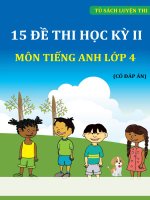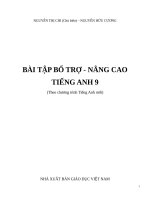Bài tập Ngữ pháp lý thuyết (tiếng anh) Phần 4 có đáp án
Bạn đang xem bản rút gọn của tài liệu. Xem và tải ngay bản đầy đủ của tài liệu tại đây (629.42 KB, 6 trang )
Hanoi Open University
Learning Opportunity for All
UNIT 4: COORDINATION AND SUBORDINATION
Exercise 1. Explain the semantic relationship between the two coordinate clauses of each of
the following sentences, and make the relationship explicit by adding an adverbial:
1. I often see men who went to school with me and who have done well for themselves.
2. I am a professional man of letters and a typewriter is essential to my work.
3. If other people are willing to make and use machines for my benefit, and they seem
willing and eager to do so, I am not less willing to let them do so.
4. These sharks are very dangerous, and they have never attacked me so far.
5. Lay a hand on me and I’ll scream.
6. A coral reef is a flower garden of stone, and it is filled with the most colour-ful varieties
of life.
7. Another prospect remains to be considered and that is a combination of bridge and tube
or tunnel.
8. Now that our son is able to walk, we lay ladders flat instead of leaving them propped up
against things; and we shut the garden gate.
9. Man is the only animal that tortures its own species for amusement; and during much of
his evolution he has been busily engaged in ruining his own habitat.
10. Japan’s position on the edge of the monsoon region has made highly productive rice
cultivation possible, and the Japanese island are surrounded by rich fishing grounds.
Suggested answers for exercise 1.
1. (and who) subsequently. 2. (is) therefore. 3. (and) indeed. 4. (and) yet. 5. (and) then or if
you do. 6. (and) moreover. 7. (that), namely. 8. (and we) also. 9. (and) furthermore. 10. (and)
at the same time.
Exercise 2. Combine each of the following pairs of simple sentence so as to form one sentence
containing EITHER both… and OR either … or OR neither … nor OR no (t) … but OR not
only … but also:
Ngữ pháp lý thuyết_ Exercise - Unit 4
trang 1
Hanoi Open University
Learning Opportunity for All
1. Sometimes my old school friends nod a quick greeting and walk on when they see me.
Sometimes they avert their eyes to a shop window.
2. George shouted a friendly greeting to me. Then he came over and shook me warmly by
the hand.
3. The fire destroyed St Paul’s Cathedral. It also destroyed the Guildhall.
4. The primitive fire engines had no effect on the conflagration. Furthermore, pulling down
half-timbered buildings in the path of the fire had no result whatever.
5. In 1666 fire-fighters set up fire-posts with communications between them. The same thing
was done in 1940.
6. The city was not abandoned after the fire of 1666. It was not abandoned after the fires of
1940.
7. I have given up using a telephone. What is more, I have given my typewriter away.
8. I have no objection to other people driving cars. I refuse to drive one myself.
9. Is a shark comes towards you, you must not to show fear. You must not dart away when
one comes into view either.
10. Some zoologists thought the strange creature was a rorqual. Other zoologists thought it
was a giant squid.
Suggested answers for exercise 2.
1. Either my old school friends ........, or they avert ...... 2. George not only shouted ...... but he
also came ........ 3. The fire destroyed both ..... and .........4. Neither the primitive fire-engines
had any effect ......., nor did pulling down have any result whatever. 5. Both in 1666 in 1940
fire-fighters ....... 6. The city was abandoned neither after the fire of 1666 nor after ........ 7. I
have both give up ..... and given my typewriter away. 8. I have no objection ......, but I refuse
....... 9. ....... you must neither show fear nor dart away ....... Zoologists thought the strange
creature was either a ...... or a ......
Exercise 3. Rewrite the following sentences omitting whatever can be ellipted without change
of meaning:
1. When you are in Rome, do as Rome does.
Ngữ pháp lý thuyết_ Exercise - Unit 4
trang 2
Hanoi Open University
Learning Opportunity for All
2. When he was pressed to take part in politics, he firmly declined.
3. There were no stores of boots that were readily available.
4. He threw himself from his horse and lay still as if he had been shot.
5. Any foreigner, however innocent he might be, was attacked.
6. If you were left alone on a desert island, what would you do first?
7. If other people are willing to make and use machines for my benefit. Ia ma not less willing
to let them make and use machines for my benefit.
8. I do not wish to take part in this protest, and I do not intend to take part in it.
9. Unless you are travelling by the coach, please let the Secretary know when you expect to
arrive.
10. The castle, which was built in the twelfth century, has dominated the valley ever since.
11. Much of the earth’s surface is formed by sedimentary rocks that is to say, rocks which
were formed by the deposition of sand , silt and clay.
12 Our atmosphere, while it is beneficial for life in general, prevents us from seeing the
universe in any but a very restricted range of light.
Suggested answers for exercise 3.
Omit: 1. you are. 2. he was. 3. that were. 4. he had been. 5. he might be. 6. you were. 7. the
last seven words. 8. the second 1; and take part in it. 9. you are. 10. which was. 11. rocks
which were formed. 12. it is.
Exercise 4. Rewrite the following sentences omitting whatever can be ellipted without change
of meaning:
1. The Chinese are as interested in food as are the French, and the Chinese go to immense
trouble to see that it is properly cooked.
2. The Cantonese have developed an astonishing variety in their cooking and they have
brought the preparation of sharksfin soup to an exceedingly fine art.
3. Chinese food has to be served in small pieces, it has to be picked up little by little with
chopsticks and it has to be eaten slowly.
Ngữ pháp lý thuyết_ Exercise - Unit 4
trang 3
Hanoi Open University
Learning Opportunity for All
4. Rice is generally eaten in the south of the country, but wheat is generally eaten in the
north.
5. The meat and vegetables are cut up very small in the kitchen, they are cooked in a large
iron bow, and they are served hot.
6. Fat is used for cooking in northern Europe, but oil is used for cooking in China.
7. Szechuan is the best place for chillies and Canton is the best place for stuffed snails.
8. The Chinese eat their food with chopsticks, the Europeans eat their food with knives and
forks.
9. European marriages are often celebrated with champagne. Chinese marriages are often
celebrated with a meal of a least a dozen courses.
10. A western-style dinner would not include bread on the menu, nor would a Chinese dinner
include rice on the menu.
11. Many people have been suffering from influenza and many people still are suffering from
influenza.
12. You say people have influenza two or three times a year, but they don’t really have
influenza two or three times a year.
13. During an epidemic many people seem to escape infection but they do not really escape
infection.
14. A young animal has to decide which of the things around it are to be eaten and which of
the things around it are to be avoided.
15. Some animals swallow highly dangerous objects, others instinctively avoid highly
dangerous objects.
16. The young animal is playing a game which can be very dangerous and often is very
dangerous.
17. The young animal is protected from danger by its parents, or is protected from danger by
some mechanism built into its nervous system from the start.
18. Some people require eight hours’ sleep a night, others are satisfied with six hours’ sleep
a night or less.
Ngữ pháp lý thuyết_ Exercise - Unit 4
trang 4
Hanoi Open University
Learning Opportunity for All
19. We cannot give a formula for individual sleep requirements, nor can we give a reliable
average of sleep requirements for different age groups.
20. People who pride themselves on needing little sleep may imagine themselves more
efficient than others, but in fact they often prove to be less efficient than others.
Suggested answers for exercise 4.
Omit: 1. the second occurrence of the Chinese. 2. they have. 3. both occurrences of it has to
be. 4. the second is generally eaten. 5. both occurrences of they are. 6. the second is used for
cooking. 7. the second is the best place. 8. the second eat their food. 9. the second (marriages)
are often celebrated. 10. either the second include and the second on the menu, or the first on
the menu, with a comma affer rice. 11. the first from influenza , and the second people. 12. the
last eight words. 13. either the first infection or the second escape infection. 14. the second of
the things around it. 15. the first highly dangerous objects. 16. the first very dangerous. 17.
the second is protected from danger. 18. the second hours' sleep a night. 19. of sleep
requirements. 20. the last three words.
Exercise 5. Classify the words underlined in the following sentences as either prepositions or
subordinators:
1. I am speaking to you as your doctor.
2. You talk exactly as a doctor does.
3. Since leaving school, I have travelled round the world.
4. I haven’t been back to my old school since I came up to university.
5. Since the beginning of the year, I haven’t written a single essay.
6. Take two of the tablets before going to bed.
7. Take two more before breakfast next morning.
8. I will not go near her house until she sends me a written explanation.
9. With so many people chatting, it was impossible to hear what the speaker was trying to
say.
10. I can’t work in a room with so many other people.
Ngữ pháp lý thuyết_ Exercise - Unit 4
trang 5
Hanoi Open University
Learning Opportunity for All
11. He would never put himself out for anybody.
12. For anybody to pretend such a thing is nonsense.
Suggested answers for exercise 5.
Ex. 176. 1. prep. 2. sub. 3. sub. 4. sub. 5. prep. 6. sub. 7. prep. 8. sub. 9. sub. 10. prep. 11. prep.
12. sub.
Ngữ pháp lý thuyết_ Exercise - Unit 4
trang 6









